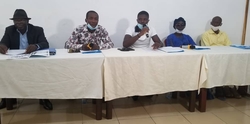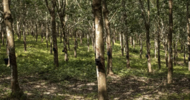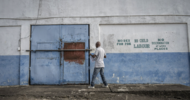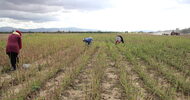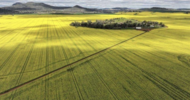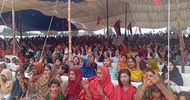CED | 1 July 2021
Yaounde, 1 July 2021: Today, local communities hold a press conference to protest against the Roundtable for Sustainable Palm Oil (RSPO) certificate awarded to Socfin’s daughter company SAFACAM in Cameroon on 30 December 2020. The communities allege that SAFACAM does not comply with various social and environmental RSPO principles and criteria. The certificate was awarded by certification body SCS Global Services (SCS) despite a flawed process, that did not take important information from relevant stakeholders into account.
The SAFACAM plantation is the result of a long process that started in 1897 when Cameroon was under the German protectorate. It is located in the Dizangue locality in the Littoral region. Four native communities lost their customary lands to the development and extension of its plantations without their free, prior and informed consent: Nsèppé Elog-Ngango, Dikola, Koungué Somsè and Koungué Lac Ossa. Ever since, land disputes, water pollution, harassment, intimidation and other malpractices are negatively affecting the rights and livelihoods of local communities.
For the community leader Michel ESSONGA: ‘It is difficult to understand for us why SAFACAM received the RSPO label without having to change its practices drastically. They are far from being a responsible company. They violate our land rights and pollute our streams and rivers. People are intimidated and harassed. Why did the auditors not take note of our issues and grievances? This leaves us with no other option than to demand the withdrawal of the certificate.”
The RSPO is an industry body that certifies plantations against environmental and social criteria. Companies that receive the certificate are seen as ‘sustainable’ by financiers and palmoil buyers. Samuel Nguiffo, Secretary General at Centre pour l’Environnement et le Développement (CED), states that ‘This is the first certificate of its kind for palmoil plantations in Cameroon and the certification body SCS sets a bad precedent. It gives the impression that it is not necessary for a company to commit to social and environmental practices in order to be certified. RSPO certification has truly lost its credibility in Cameroon.”
Several stakeholders filed a complaint with SCS in November 2020 and Assurance Services International (ASI), the accreditation organisation, in June 2021. Alleging a flawed certification process that led to two new positive certification decisions for Safacam in Cameroon and SOGB in Ivory Coast. Two controversial companies, according to civil society and affected communities. The complainants monitored the process and found that the consultation announcement was not made in the appropriate language, communities and subgroups in communities were not able to join the consultation meetings or were not invited in the first place. Especially those community members that have issued criticism about the practices of the company. This goes against the RSPO requirement for SCS to include all relevant information and stakeholders in the assessments.
Also, various land disputes, as described by the community members in great detail, are not assessed by the SCS auditors. Those land conflicts and other grievances are not included in the SCS RSPO public summary audit report. The independence of the audit was questioned by communities during the audit itself. To the extent that one community send the audit team away. At least two community members reported on intimidation related to the audit. Confidentiality and a safe space for the consultations, were not achieved. Also there are fundamental questions about why only a small part of the SAFACAM plantation was audited by SCS.
Historical injustices and complex power relations between administration, traditional leadership and communities cannot be audited in a few days or in a one hour meeting with affected communities.
The RSPO audit seemed to be a tick-the-box formality, where it was more important to check the paperwork than to guarantee compliance with the RSPO standards.
More information:
PRESS STATEMENT : EMBARGO 1 July 2021 9:30 CEST / 8:30 WAT
Socfin’s RSPO certification challenged by affected communities in Cameroon
Yaounde, 1 July 2021: Today, local communities hold a press conference to protest against the Roundtable for Sustainable Palm Oil (RSPO) certificate awarded to Socfin’s daughter company SAFACAM in Cameroon on 30 December 2020. The communities allege that SAFACAM does not comply with various social and environmental RSPO principles and criteria. The certificate was awarded by certification body SCS Global Services (SCS) despite a flawed process, that did not take important information from relevant stakeholders into account.
The SAFACAM plantation is the result of a long process that started in 1897 when Cameroon was under the German protectorate. It is located in the Dizangue locality in the Littoral region. Four native communities lost their customary lands to the development and extension of its plantations without their free, prior and informed consent: Nsèppé Elog-Ngango, Dikola, Koungué Somsè and Koungué Lac Ossa. Ever since, land disputes, water pollution, harassment, intimidation and other malpractices are negatively affecting the rights and livelihoods of local communities.
For the community leader Michel ESSONGA: ‘It is difficult to understand for us why SAFACAM received the RSPO label without having to change its practices drastically. They are far from being a responsible company. They violate our land rights and pollute our streams and rivers. People are intimidated and harassed. Why did the auditors not take note of our issues and grievances? This leaves us with no other option than to demand the withdrawal of the certificate.”
The RSPO is an industry body that certifies plantations against environmental and social criteria. Companies that receive the certificate are seen as ‘sustainable’ by financiers and palmoil buyers. Samuel Nguiffo, Secretary General at Centre pour l’Environnement et le Développement (CED), states that ‘This is the first certificate of its kind for palmoil plantations in Cameroon and the certification body SCS sets a bad precedent. It gives the impression that it is not necessary for a company to commit to social and environmental practices in order to be certified. RSPO certification has truly lost its credibility in Cameroon.”
Several stakeholders filed a complaint with SCS in November 2020 and Assurance Services International (ASI), the accreditation organisation, in June 2021. Alleging a flawed certification process that led to two new positive certification decisions for Safacam in Cameroon and SOGB in Ivory Coast. Two controversial companies, according to civil society and affected communities. The complainants monitored the process and found that the consultation announcement was not made in the appropriate language, communities and subgroups in communities were not able to join the consultation meetings or were not invited in the first place. Especially those community members that have issued criticism about the practices of the company. This goes against the RSPO requirement for SCS to include all relevant information and stakeholders in the assessments.
Also, various land disputes, as described by the community members in great detail, are not assessed by the SCS auditors. Those land conflicts and other grievances are not included in the SCS RSPO public summary audit report. The independence of the audit was questioned by communities during the audit itself. To the extent that one community send the audit team away. At least two community members reported on intimidation related to the audit. Confidentiality and a safe space for the consultations, were not achieved. Also there are fundamental questions about why only a small part of the SAFACAM plantation was audited by SCS.
Historical injustices and complex power relations between administration, traditional leadership and communities cannot be audited in a few days or in a one hour meeting with affected communities.
The RSPO audit seemed to be a tick-the-box formality, where it was more important to check the paperwork than to guarantee compliance with the RSPO standards.
More information:
- Summary of research findings on Socfin certification in Cameroon, Nigeria, Sierra Leone and Ivory Coast.
- Research report ‘Palm oil Certification: Not ‘Out of the Woods’
- Public Summary report RSPO SAFACAM: https://www.rspo.org/certification/search-for- certified-growers (type Cameroon in Search field)
Spokespersons:
Centre pour l’Environnement et le Développement (Friends of the Earth Cameroon, CED): Stella Tcoukep, [email protected], +237 6 94 59 06 79
For questions on the research report: Milieudefensie (Friends of the Earth Netherlands): Danielle van Oijen, [email protected], +31(0)634019215


